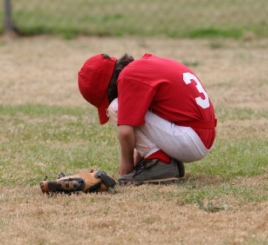Of the tens of thousands of e-mails MomsTeam has received over the years, most distressing are those that detail how often emotional or even physical abuse of youth sports athletes in the name of winning. Simply put, there is no excuse for such abuse.
Typical is the following story:Stairway to abuse?
"Courtney, knock it off!" the coach admonished. "Stop your crying, and wipe your face! You are a selfish player by showing up late and I'm going to get rid of selfish players. You know my rules. Rule number one is to be at practice on time. Late is late, whether it's thirty seconds or thirty minutes. The only time that will be used is my watch, which is set to the school clock. You were five minutes late. Because this is your first time being late, your 'reminder' is to run ten sets of bleacher stairs, and do five defensive hustle drills.
"You're not finished running. Get back up there! Fast," Courtney's coach screamed with the voice of a Marine drill sergeant.

After running the stairs for twenty minutes, Courtney became ill and ran to the bathroom, where she vomited. When she returned to the basketball court - humiliated, scared and too sick to continue - her coach ordered her to finish her stair running.
Courtney's mother, Sandra, reported that a similar scenario played out with another girl the very next day. This time the girl threw up twice. Sandra told me that parents had lodged numerous complaints about the coach, but got nowhere. "We're planning to take this issue up with the school board and possibly file a lawsuit if we can't get positive resolution," said her e-mail, "but I would appreciate any and all guidance, you can give."
I suggested that Sara and her husband meet with the coach and to call me if the matter was not satisfactorily resolved. After the meeting, she wrote again: "We did have the meeting, but I feel nothing was accomplished. The principal and the coach actually sat there in the meeting and laughed at my husband and me when we voiced our concern over making a twelve-year-old girl run until she puked. Their response was, "Well, if she can't take it, she doesn't have to play."
"They said they wanted a winning basketball team, and that they would do whatever it took to get it. I voiced my concerns over the physical and mental well-being of the girls on the team. They told me I would never change a thing, that I was the minority in my way of thinking."
The next day, Courtney brought home a contract for participation in junior high and high school girl's athletics, including a long list of the coach's rules and the punishments for breaking them. One required that players who failed to make at least seven out of ten free throws in practice to run one "up and back" for each free throw missed short of the required seven. Another required players to run one up and back for every free throw missed in a game. The same rules applied to everyone, whether a 12-year-old seventh grader or an 18-year-old high school senior.
Following the list of the coach's rules and punishments was an eight paragraph missive on his coaching philosophy, including statements that:
- Only girls he felt could "compete and handle the pressure" would get playing time;
- He would "always play to win."
- Girls would be punished, as he saw fit, for poor defensive play and lack of hustle;
- Only girls who had rides to school in the morning could be on the team because practice started before school buses arrived;
- All practices were closed to parents.
- "Playing is a privilege, not a right."
What constitutes child abuse in sports?
What actually constitutes child abuse? When is a coach being abusive as opposed to just being a strict disciplinarian? How can a parent tell the difference? Were Courtney's parents right to complain? Was the coach, in fact, engaging in child abuse?
In order to answer these questions, one needs to know what actually constitutes child abuse in the sports context.
As a general rule, child abuse:
- Is any form of physical, emotional or sexual mistreatment or lack of care (i.e. neglect) of a child that leads to injury or harm;
- Usually occurs when someone uses his or her power or position of trust to harm your child physically, emotionally, or sexually, either directly or through neglect; and
- Can be inflicted by a wide variety of actors: a coach, another player, a parent, a volunteer, spectator or an official; and
- Can be inflicted on a child regardless of age, gender, race or ability.








